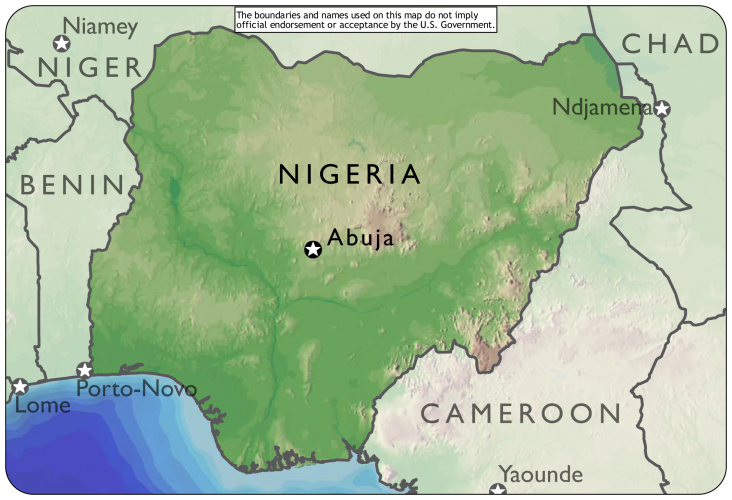- What We Do
- Agriculture and Food Security
- Democracy, Human Rights and Governance
- Economic Growth and Trade
- Education
- Ending Extreme Poverty
- Environment and Global Climate Change
- Gender Equality and Women's Empowerment
- Global Health
- Water and Sanitation
- Working in Crises and Conflict
- Disaster Assistance
- Political Transition Initiatives
- Conflict Mitigation and Prevention
- Countering Violent Extremism
- Disaster Risk Reduction
- Peacebuilding and Reconciliation
- Providing Safe & Secure Environments for Development
- Recovering From Crisis
- Resilience
- Tech Challenge for Atrocity Prevention
- World Humanitarian Day
- U.S. Global Development Lab

Minimizing the conditions that allow terrorism to flourish in Northeast Nigeria.
WHY USAID/OTI IS IN NIGERIA
Nigeria is one of the U.S. Government’s most strategic allies in sub-Saharan Africa. Since the successful democratic transition of power in 2015, Nigeria still struggles with insecurity caused by Boko Haram and ISIS-West Africa (BH/ISWA). An escalated military offensive by Nigerian and regional security forces helped the government reclaim areas previously held by BH/ISWA and provided an opportunity for communities to transition back to their homes. The insurgency is far from over, however, as BH/ISWA have increased attacks in Nigeria and neighboring countries in the Lake Chad Basin. To effectively defeat BH/ISWA, military operations must be coupled with efforts to address the underlying drivers of violent extremism.
USAID/OTI’S ROLE IN NIGERIA
USAID/OTI launched the Nigeria Regional Transition Initiative (NRTI) to minimize the conditions that allow terrorism to flourish, in turn reducing BH/ISWA recruitment and support for their ideology. Through small-scale, strategically targeted assistance to local partners, NRTI is:
-
Engaging vulnerable youth;
-
Battling violent extremist narratives and addressing economic drivers of extremism;
-
Building a stronger sense of community and repairing social fabric;
-
Promoting confidence in local and national government responsiveness; and
-
Supporting reintegration efforts of former BH/ISIS-WA affiliates as a component of the government’s Disarmament, Demobilization and Reintegration process.
PROGRAM HIGHLIGHTS
- USAID/OTI launched Dandal Kura, the first shortwave radio program broadcast in Kanuri, the primary language used by those claiming an affiliation with BH/ISWA and spoken by 10 million people in the Lake Chad Basin. Dandal Kura has a broad and loyal listenership and is building a sense of identity and belonging among an otherwise discounted population.
- USAID/OTI empowered 100 youth activists from five West African nations at the first Regional Youth Summit on Countering Violent Extremism (CVE) in Maiduguri. Participants created country-specific CVE action plans, initiated follow-up meetings in additional countries and built a network of peers fighting a common enemy across the region.







Comment
Make a general inquiry or suggest an improvement.